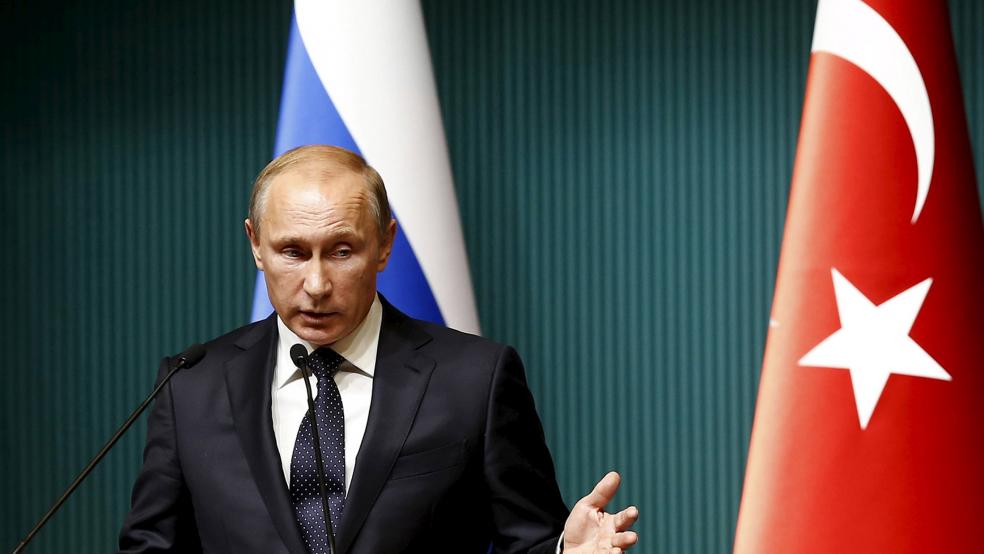While there has been no further military engagement between Russia and Turkey since a Russian bomber was shot down by the Turkish Air Force last month, the war of words in the most volatile region of the Middle East continues to escalate.
In a roundtable interview with reporters on Wednesday, a senior Turkish official accused Russia of conducting an “ethnic cleansing” campaign in the northern part of Syria. At the same time, Russian President Vladimir Putin was reminding the world in general, and Turkey in particular, that not only is Russia a nuclear power, but that the Kremlin has nuclear-capable missiles aboard a submarine stationed just off Turkey’s coastline.
Related: ISIS Is Winning the Recruitment War as Foreign Fighters Flow into Syria
Russia has been bombing parts of Syria since late September in a military intervention that is plainly aimed at propping up the regime of dictator Bashar al-Assad, one of the Kremlin’s few allies in the region. Turkey has accused Russia of focusing its attacks on parts of northern Syria, where many ethnic Turks, known as Turkmen, as well as Sunni Muslims live.
When a Russian bomber strayed into Turkish airspace for a short time last month, Turkish fighters shot it down, causing the death of one of the pilots and contributing to the death of a Russian marine sent as part of a rescue team.
The incident briefly sparked concern that Russian retaliation would lead to war, but the leadership in Moscow, while plainly furious, said that it would retaliate through economic rather than military means.
Beyond Russia’s decision not to escalate the conflict militarily, restraint has not been a hallmark of the current crisis. Both Turkish President Recep Tayyip Erdogan and Russian President Vladimir Putin have made a series of angry and insulting statements about the downing of the Russian plane.
Related: Putin Stirs the Pot in turkey and Iraq
Last week, Turkey sent armored units into Northern Iraq, sparking protest from the Iraqi government, and has reportedly been bombing Kurdish groups in northern Iraq.
Now, in a widely reported interview with international reporters, Turkish Prime Minister Ahmet Davutoglu said that Russia’s bombing campaign in Syria is not, as has been claimed by the Kremlin, an effort to destroy the terror group ISIS. Instead, he claimed, it is “ethnic cleansing in northern Latakia to force out all Turkmen and the Sunni population.”
Latakia is a region in northern Syrian near the border with Turkey, in the same part of the country where Russia has established airbases, and where Assad’s forces are, generally, in control.
The Russians, said Davutoglu, are not fighting ISIS, but instead “want to expel, they want to ethnically clean this area so that regime and Russian bases in Latakia and Tartous [are] protected.”
Related: With an Eye on ISIS, Congress Moves to Tighten U.S. Travel Rules
In saying that Russia is engaged in ethnic cleansing, Davutoglu is at minimum accusing Russia of something the International Criminal Court views as a crime against humanity, and which under the circumstances might be considered a war crime.
On Wednesday, after receiving a public report about Russian operations in Syria, including notice that cruise missiles had been fired from a submarine in the Mediterranean Sea at targets in Syria, Putin delivered a none-too-subtle reminder that Russia is still a formidable foe.
“With regard to strikes from a submarine, Putin said, “we certainly need to analyze everything that is happening on the battlefield, how the weapons work. Both the missiles and the Kh-101 rockets are generally showing very good results. We now see that these are new, modern and highly effective high-precision weapons that can be equipped either with conventional or special nuclear warheads.”
Related: From Obama and ISIS to Trump, Hillary Clinton Lets Loose
Of course, he added, “We do not need that in fighting terrorists, and I hope we will never need it. But overall, this speaks to our significant progress in terms of improving weaponry and equipment being supplied to the Russian army and navy.”
It also speaks to an increasingly bellicose-sounding Turkey about what tangling with the Russian bear would mean.





